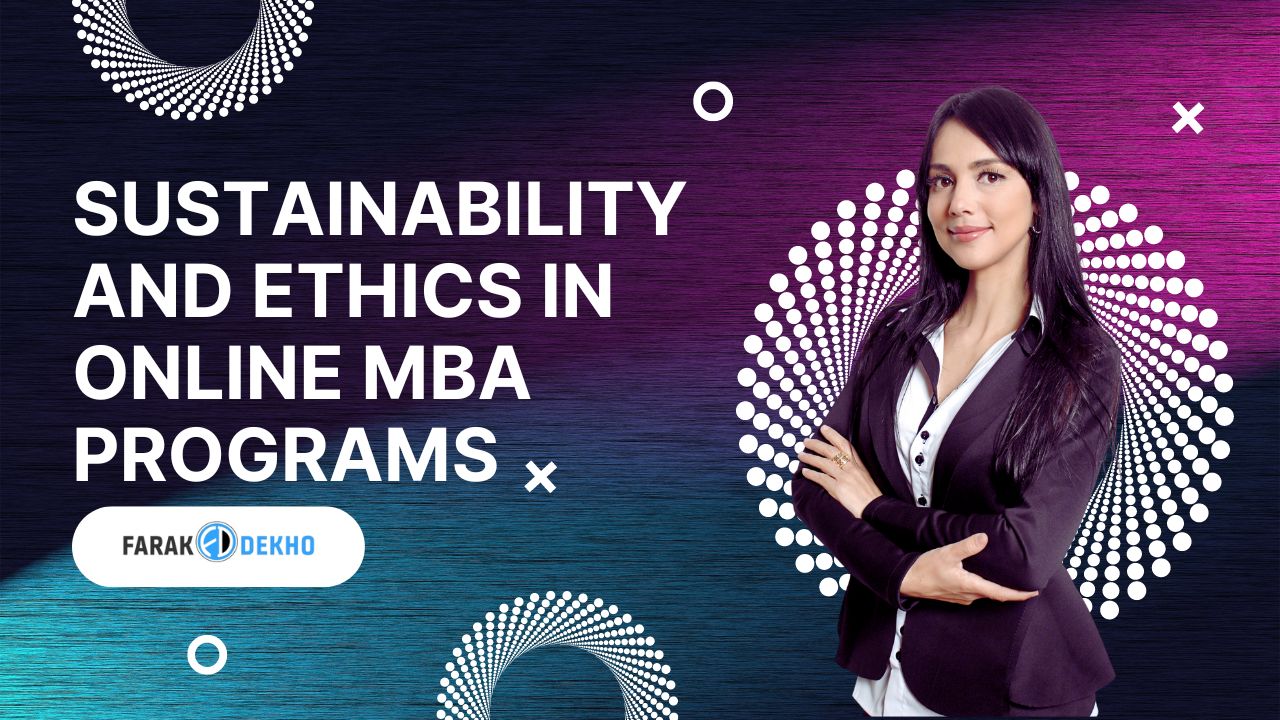Table of Contents
- Introduction
- Understanding Sustainability in Online MBA Programs
- Ethics in Online MBA Programs
- Integrating Sustainability into Online MBA Curriculums
- Case Studies of Sustainable Online MBA Programs
- Challenges in Implementing Sustainability and Ethics in Online MBAs
- Benefits of Emphasizing Sustainability and Ethics in MBA Education
- Future Trends in Sustainability and Ethics in Online MBA Programs
- Student Perspectives on Sustainability and Ethics
- How to Choose an Online MBA Program Focused on Sustainability and Ethics
- Role of Faculty in Promoting Sustainability and Ethics
- Corporate Partnerships and Collaborations
- Sustainability and Ethics in MBA Capstone Projects
- Online Resources and Tools for Sustainability and Ethics in MBA Programs
- Conclusion
- FAQs.
Introduction
Sustainability and Ethics in Online MBA Programs, In today’s rapidly evolving business landscape, the concepts of sustainability and ethics are more important than ever. As future business leaders, MBA students must be equipped with the knowledge and skills to navigate these crucial areas. Online MBA programs are increasingly incorporating sustainability and ethics into their curriculums, reflecting the growing demand for responsible and conscious business practices.
Understanding Sustainability in Online MBA Programs
Definition of Sustainability
Sustainability refers to meeting the needs of the present without compromising the ability of future generations to meet their own needs. In the context of business education, it encompasses environmental stewardship, social responsibility, and economic viability.
Why Sustainability Matters in Education
Educating future leaders about sustainability is essential to ensure they understand the long-term impacts of their business decisions. By integrating sustainability into MBA programs, institutions are preparing students to create value not only for their companies but also for society and the environment.
Ethics in Online MBA Programs
Definition of Ethics
Ethics involves the principles and standards that guide behavior in the world of business. It includes issues like integrity, fairness, and accountability, which are crucial for maintaining trust and credibility in any business environment.
Importance of Ethics in Business Education
Ethical business practices are fundamental to building sustainable organizations. MBA programs that emphasize ethics help students develop a moral compass, enabling them to make decisions that are not only profitable but also principled and fair.
Integrating Sustainability into Online MBA Curriculums
Key Areas of Focus
Online MBA programs focused on sustainability typically cover topics such as sustainable business strategies, corporate social responsibility (CSR), and environmental management. These areas provide students with a comprehensive understanding of how businesses can operate sustainably.
Examples of Courses and Modules
Courses may include titles like “Sustainable Business Models,” “Environmental Economics,” and “Ethical Leadership.” These modules are designed to equip students with the knowledge to implement sustainable practices in their future careers.
Case Studies of Sustainable Online MBA Programs
Leading Institutions and Their Initiatives
Several top institutions have made significant strides in integrating sustainability into their online MBA programs. For instance, the University of North Carolina’s Kenan-Flagler Business School offers a concentration in Sustainable Enterprise, while Arizona State University’s W.P. Carey School of Business emphasizes sustainability across its curriculum.
Success Stories
Graduates from these programs have gone on to implement sustainable practices in various industries, from renewable energy to sustainable finance, demonstrating the real-world impact of their education.
Challenges in Implementing Sustainability and Ethics in Online MBAs
Common Obstacles
Implementing these concepts in MBA programs can be challenging. Common obstacles include resistance to change, lack of faculty expertise, and insufficient resources.
Possible Solutions
Solutions to these challenges involve increasing faculty training, securing funding for sustainability initiatives, and fostering a culture of innovation and openness to new ideas within the institution.
Benefits of Emphasizing Sustainability and Ethics in MBA Education
Personal and Professional Development
Students who study sustainability and ethics gain a deeper understanding of the broader impact of their business decisions. This holistic perspective can enhance their personal and professional development, making them more effective and conscientious leaders.
Impact on Business Practices
Businesses led by ethically-minded leaders are more likely to adopt sustainable practices, contributing to long-term success and positive societal impact. This alignment of values can also attract customers, investors, and employees who prioritize sustainability.
Future Trends in Sustainability and Ethics in Online MBA Programs
Emerging Topics and Innovations
Future trends in this field may include greater emphasis on circular economy principles, advances in sustainable technology, and increased focus on social justice issues within the business context.
Predictions for the Next Decade
As the demand for sustainable and ethical business practices grows, online MBA programs will likely continue to evolve, incorporating the latest research and best practices to prepare students for the challenges of tomorrow.
Student Perspectives on Sustainability and Ethics
Student Testimonials
Many students report that courses on sustainability and ethics have been among the most impactful parts of their MBA experience. These courses challenge them to think critically about their values and the kind of leaders they want to become.
Alumni Experiences
Alumni often share stories of how their education in sustainability and ethics has influenced their careers, leading to opportunities in fields like sustainable consulting, ethical investment, and corporate responsibility.
How to Choose an Online MBA Program Focused on Sustainability and Ethics
Key Factors to Consider
Prospective students should look for programs that offer specialized courses in sustainability and ethics, have faculty with expertise in these areas, and demonstrate a commitment to these values through institutional initiatives.
Tips for Prospective Students
It’s also helpful to research the program’s partnerships with organizations known for their sustainability efforts and to speak with current students and alumni about their experiences.
Role of Faculty in Promoting Sustainability and Ethics
Faculty Initiatives and Research
Faculty play a crucial role in integrating sustainability and ethics into the curriculum. Their research and initiatives often drive the development of new courses and the incorporation of these topics into existing ones.
Importance of Faculty Commitment
Faculty commitment to sustainability and ethics ensures that these values are not just theoretical concepts but are woven into the fabric of the educational experience.
Corporate Partnerships and Collaborations
Examples of Successful Partnerships
Many online MBA programs collaborate with corporations to provide students with real-world experience in sustainability and ethics. For example, partnerships with companies committed to CSR can offer internships, projects, and networking opportunities.
Benefits for Students and Institutions
These collaborations benefit students by providing practical experience and networking opportunities, while institutions can enhance their reputation and attract more students by demonstrating their commitment to these important values.
Sustainability and Ethics in MBA Capstone Projects
Examples of Capstone Projects
Capstone projects focused on sustainability and ethics allow students to apply their learning to real-world challenges. Examples include developing sustainable supply chain strategies, creating CSR initiatives, and designing environmentally friendly products.
Impact on Student Learning
These projects enhance student learning by providing hands-on experience and demonstrating the practical application of sustainability and ethics in business.
Online Resources and Tools for Sustainability and Ethics in MBA Programs
Recommended Readings and Websites
There are numerous online resources available for students interested in sustainability and ethics. Recommended readings include books like “The Triple Bottom Line” by Andrew Savitz and “Ethical Leadership” by Joanne Ciulla.
Online Courses and Certifications
Students can also enhance their learning through online courses and certifications from platforms like Coursera, edX, and LinkedIn Learning, which offer modules on sustainability, CSR, and ethical leadership.
Conclusion
Incorporating sustainability and ethics into online MBA programs is not just a trend but a necessary evolution in business education. These programs equip future leaders with the tools they need to make responsible and impactful decisions. As the business world continues to evolve, the importance of these concepts will only grow, making it essential for educational institutions to keep pace.
FAQs.
Sustainability in online MBA programs involves teaching students how to incorporate environmentally and socially responsible practices into their business strategies, ensuring long-term success and positive impact.
Ethics are integrated into online MBA curriculums through courses that focus on principles like integrity, fairness, and accountability, preparing students to make moral and principled business decisions.
Yes, emphasizing sustainability and ethics can enhance your career prospects by aligning you with the growing demand for responsible business practices and making you a more attractive candidate to forward-thinking employers.
Look for programs with specialized courses in these areas, faculty expertise, partnerships with sustainable organizations, and a demonstrated commitment to these values through institutional initiatives.
Yes, some notable programs include the University of North Carolina’s Kenan-Flagler Business School and Arizona State University’s W.P. Carey School of Business, both of which have strong focuses on sustainability and ethics.


